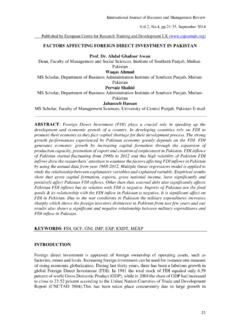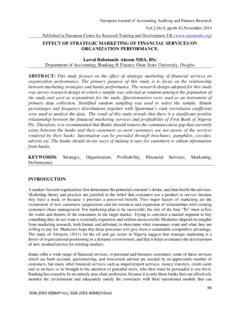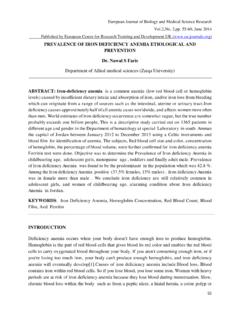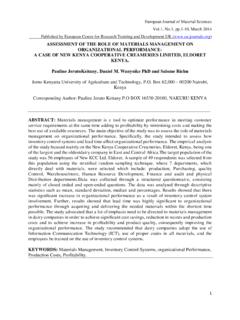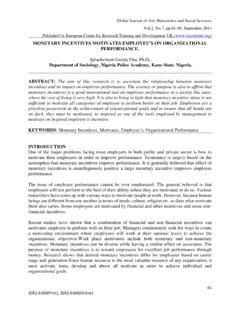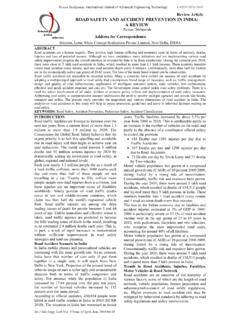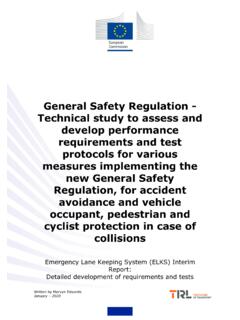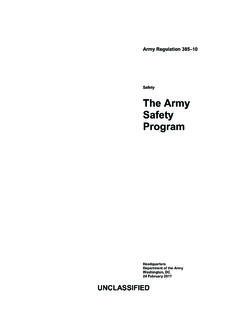Transcription of FOR IMPROVING EMPLOYEE SAFETY AND HEALTH AT …
1 International Journal of Business and Management Review , , , October 2015 ___Published by European Centre for Research Training and Development UK ( ) 60 ISSN: 2052-6393(Print), ISSN: 2052-6407(Online) OCCUPATIONAL SAFETY AND HEALTH ISSUES IN GHANA: STRATEGIES FOR IMPROVING EMPLOYEE SAFETY AND HEALTH AT WORKPLACE Maxwell Asumeng1, LebbaeusAsamani2, Joana Afful1 and Collins Badu Agyemang3 1 Department of Psychology, School of Social Sciences, College of Humanities, University of Ghana. P. O. Box LG 84, Legon, Accra, Ghana. 2 Department of Educational Foundations, University of Cape Coast, Cape Coast 3 Department of Business Administration, Faculty of Management, University of Professional Studies, Accra ABSTRACT: Contemporary employees spend most of their working lives at the workplace. Work provides economic, social and psychological experiences that promote the mental well-being of individuals.
2 The work environment should be devoid of hazards as much as possible to provide healthy and decent work for the workforce. However, numerous injuries, illnesses, property damages and process losses take place at different workplaces. There is the urgent need for guidelines to help manage and improve SAFETY and HEALTH at the workplace. Currently, there is no comprehensive national HEALTH and SAFETY policy in Ghana that provides these guidelines. This paper provides a generic guide to managing the myriad of hazards that exist at the workplaces to enhance healthy and decent work for employees in Ghana. It discusses different forms of potential hazards and provides guidelines on how they can be identified, assessed, controlled or managed when they are present in a given work setting. KEYWORDS: Industrial accidents, hazards control, decent work, SAFETY culture, SAFETY performance, SAFETY management INTRODUCTION Background to Workplace SAFETY and HEALTH Issues in Ghana Ghana is gradually becoming an industrialized nation, and this change is exposing a large percentage of the workforce to various HEALTH and SAFETY hazards at the workplace.
3 The Labour Department of Ghana Annual report (2000) gave a total of 8,692 work-related accidents reported to the Department for compensation claims, while the 1999 figure stood at 4,088. These figures represent only those occurring at the formal sector. The preamble of the International Labour Organisation (ILO) constitution highlights that the protection of the worker against sickness, diseases and injury arising out of employment is fundamental element of social justice. Occupational SAFETY and HEALTH is human right and decent work eventually is safe work (WHO, 2010). Concha-Barrientos et al., (2004) noted that people at work face a variety of hazards owing to chemicals, biological agents, physical factors, adverse ergonomic conditions, allergens, a complex network of SAFETY risks, and many and varied psychosocial factors ( As pointed out by Marmot and Wilkinson (2006), the working environment and the nature of work itself are both important influences on HEALTH .)
4 According to the the US National Alliance for the Mentally ill (NAMI, 1999), work is at the very core of contemporary life for most people, providing financial security, personal identity, and an opportunity to make a meaningful contribution to community life. Work is very essential in human life and provides a number of psychological experiences that International Journal of Business and Management Review , , , October 2015 ___Published by European Centre for Research Training and Development UK ( ) 61 ISSN: 2052-6393(Print), ISSN: 2052-6407(Online) promote the mental well-being of individuals, aside the financial gains. These include providing time structure, social contact, collective effort in a social context outside the family, social identity, and helps individuals to organize their daily lives (Warr, 1987). This suggests that the work environment should be devoid of hazard as much as possible to provide healthy and decent work for the workforce.
5 The Ghana Labour Act (Act 651, 2003) defines workplace to include any place where a worker needs to be or to go by reason of his or her work which is under the direct or indirect control of the worker ( ). (Burton, 2009, p. 23).defines a healthy workplace as : a place where everyone works together to achieve an agreed vision for the HEALTH and well-being of workers and the surrounding community. It provides all members of the workforce with physical, psychological, social and organizational conditions that protect and promote HEALTH and SAFETY . Itenables managers and workers to increase control over their own HEALTH and to improve it, and to become more energetic, positive and contented Industrial or occupational accidents can have, and in fact do have great effect on the mental HEALTH of victims as well as others who witnessed the incident. HEALTH and SAFETY of employees at the workplace are costly to the individual employees and their families, employers and the nation as a whole.
6 In addition, there are financial implications for the victim, as well as the employer. The Ghana Workmen s Compensation Law 1987(PNDC 187) requires that the employer pays all medical expenses related to any work place related accident , and in addition, pay some compensation to the accident victim. Occurrence of accident at the work place can also have serious implications for the organisation s profile. In view of this, management of HEALTH and SAFETY issues at the workplace need to be tackled with all seriousness from all angles. Pragmatic steps and policies must be put in place to ensure that unavoidable accidents and HEALTH hazards are prevented. There is the need to integrate SAFETY and HEALTH issues of employees into the organisational structure, if SAFETY of employees is to be ensured. The success of HEALTH and SAFETY management at the work place requires strong management commitment, and collaboration among SAFETY and HEALTH professionals, employees and their associations/organisations, and institutions/agencies assigned with the responsibility of ensuring HEALTH and SAFETY at the workplace need to be empowered to enforce policies and guidelines for accident prevention at the workplace to the letter.
7 Currently, Ghana does not have a national policy on occupational HEALTH and SAFETY management, as the ILO convention number 155 (1981) requires. There are however, the Factories, Offices and Shops Act 1970, (Act 328), the Mining Regulations 1970 (LI 665), and the Labour Act 2003 (Act 561), which have some regulations about HEALTH and SAFETY management at the work environment. The Ministry of HEALTH and the Ghana HEALTH Service, in collaboration with the World HEALTH Organisation (WHO) country office also commissioned the development of policy and guideline on occupational HEALTH and SAFETY for the HEALTH sector which was published in June 2010. But these are very limited in scope given the multifaceted distribution of industrial operations within the Ghanaian work setting. There is also the Workmen s Compensation Law 1987(PNDC 187) which relates to compensation for personal injuries caused by accidents atwork and hence, indirectly impacts on monitoring worker and workplace SAFETY .
8 The Radiation Protection Board of the Ghana Atomic Energy Commission also regulates companies with radiation exposure hazards. It is in view of this International Journal of Business and Management Review , , , October 2015 ___Published by European Centre for Research Training and Development UK ( ) 62 ISSN: 2052-6393(Print), ISSN: 2052-6407(Online) that we provide strategies that are analysed and synthesized into how-to manual to help improve HEALTH and SAFETY at workplaces in Ghana. Legislative Provisions on Occupational HEALTH and SAFETY in Ghana The government of Ghana has introduced Acts ( , Labour Act, 2003, Act 651 and Factories, Shops and Offices Act 1970, Act 328) and many other subsumed policies to protect the HEALTH , SAFETY and welfare of all workers. The Labour Act, for example, makes it obligatory for the employer to ensure that every worker employed in Ghana works under satisfactory, safe and healthy conditions (Labour Act, 2003 Act 651, Article 118:1).
9 This provision is in consonance with the 1992 constitution of Ghana which states that every person has the right to work under safe and healthy conditions (section 24: 1). It is required that employees use the SAFETY appliances, fire-fighting equipment and personal protective equipment provided by the employer in compliance with the employer s instructions (Labour Act, 2003 Act 651, Article 118:3). The employers obligation under the Labour Act includes setting standards to safeguard the wellbeing of their employees, providing personal protection equipment, and providing necessary information, supervision and training consistent with the level of literacy of the employees. Furthermore, the Act requires employers to report the occurrence of occupational accidents to appropriate government agencies. Employees are obligated to exercise their actions with reasonable care as they go about their normal jobs at their workplaces to ensure their SAFETY and the SAFETY of others.
10 The Act leaves the provision of standards opened to the discretion of every employer. This invariably has led to a disjointed and fragmented HEALTH and SAFETY policy bodies as different industries (employers) have different oversight on HEALTH and SAFETY issues in Ghana. The fragmentation is even clearer as Ghana has different agencies under different jurisdictions which monitor different industries for workplace and EMPLOYEE SAFETY . For instance, there is a Road SAFETY Commission but with little standards, guidelines and impact on the transport industry and road users. The Minerals Commission has the Mining Regulations 1970, which contains some guidelines in Occupational SAFETY and HEALTH but just for the Mining Industry. Numerous injuries, illnesses, property damages and process losses take place at different workplaces but due to under reporting or misclassification due to lack or thorough standards, or unfamiliarity with the existing guidelines, people are not normally in the known of such events as well as their actual or potential consequences.
